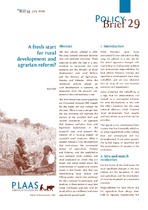| dc.contributor.author | Hall, Ruth | |
| dc.date.accessioned | 2019-02-25T11:23:46Z | |
| dc.date.available | 2019-02-25T11:23:46Z | |
| dc.date.issued | 2009 | |
| dc.identifier.citation | The CROSCOG project team. (2009). Commons Governanace in South Africa. Policy Brief 28, Bellville: Institute for Poverty, Land and Agrarian Studies, University of the Western Cape | en_US |
| dc.identifier.uri | http://hdl.handle.net/10566/4282 | |
| dc.description.abstract | The commons (or common-pool
resources)1 are the most important
resources in southern Africa. The livelihoods
of the majority and economies
of most countries depend on them.
Although common property regimes
are often condemned as environmentally
unsustainable, economically
unviable or socially anachronistic, this
mode of natural resource tenure and
governance remains vitally necessary
in the livelihoods of the rural poor
across much of the region (Hara et al.,
2009). Away from a limited number of
project-based efforts for communitybased
management (often focused on
specific natural resource sectors), such
as Zimbabwe’s high-profile CAMPFIRE,
millions of poor, rural people across the
region continue their own integrated
efforts to manage and live from the
ecosystems that surround them. This,
above all, is a challenge to governance.
The poor must tackle it – and governments
and development agencies must
support their endeavours (ibid.). | en_US |
| dc.language.iso | en | en_US |
| dc.publisher | Institute for Poverty, Land and Agrarian Studies, University of the Western Cape | en_US |
| dc.relation.ispartofseries | Policy Brief;2009 | |
| dc.subject | Commons | en_US |
| dc.subject | Southern Africa | en_US |
| dc.subject | Socially anachronistic | en_US |
| dc.subject | Resources | en_US |
| dc.subject | Unsustainable | en_US |
| dc.title | A fresh start for rural development and agrarian reform? | en_US |
| dc.type | Other | en_US |

